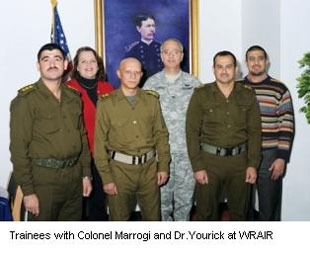New Strategic Partnership
2011 brings a new year and a new strategic partnership between the Iraqi Ministry of Defence and U.S. Department of Defense serving Soldiers and civilians security and health in both Iraq and the United States. Walter Reed Army Medical Center hospital and the Walter Reed Army Institute of Research (WRAIR) are hosting six Iraqi medical providers, three physical therapists, two microbiologists, and one microchemist.
Arriving on Jan. 2, the six Iraqi physical therapists and medical microbiologists began their training rotation. Although the Army Medical Research and Material Command hosted three medical centric visits in 2010, this six-week program is the first of its kind. The rotation provides a unique combination of lectures and hands-on learning opportunities for the Iraqi medical providers to connect with other expertise and specialists from world renowned, long standing medical military centers.
The training group is split three and three, three at WRAIR and three at WRAMC. At WRAIR, Col. Aizen Marrogi is managing a busy curriculum for the three microbiologists. It is expected the program will "establish collaboration in the spheres of the WRAIR mission of Infectious and Communicable diseases with Iraqi MOD Medical affairs." The goal is for them to become the founding core of Iraqi scientific collaborations and provide critical insight to combat the medical problems plaguing Iraq.
Lt. Col. Shannon Lynch oversees the training at WRAMC. The three physical therapists are focusing on physical therapy rehabilitation and prosthetic management for the patients with amputations and multi-trauma, as well as general orthopedic conditions most commonly seen in any physical therapy center. The program is a combination of lectures, labs, and patient observations in the Military Advanced Training Center. Lynch states that "the goal is to provide these therapists insight and training into how we manage our military population with these injuries so they can be the leaders and planners of military rehabilitation programs in Iraq as they develop centers similar to WRAMC's Military Advanced Training Center."
This training module encourages continued medical diplomacy as an essential portion of a nation's stability. Through protecting Soldiers and civilians health, Marrogi believes this is a "fundamental cornerstone in strengthening the emerging strategic partnership between Iraq and U.S." and is "proud that WRAIR is contributing a significant piece in building this relationship to the benefit the Soldiers and people in both great nations." Finally, programs such as this partnership may translate into new directions for training collaborations at the WRAIR's laboratories in Kenya and Thailand (U.S. Army Medical Research Unit- Kenya and the US Army Component'Armed Forces Institute of the Medical Sciences in Thailand).
 An official website of the United States government
An official website of the United States government
 ) or https:// means you've safely connected to the .mil website. Share sensitive information only on official, secure websites.
) or https:// means you've safely connected to the .mil website. Share sensitive information only on official, secure websites.



